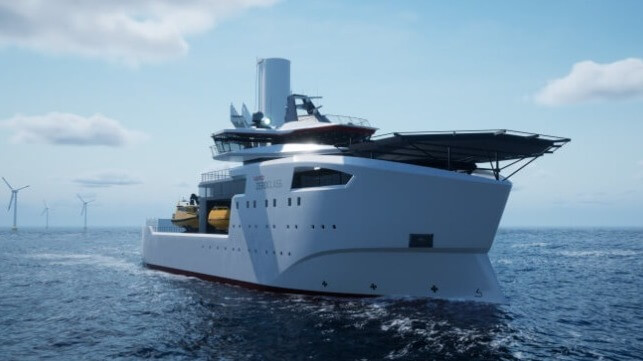Norway Funds Research Projects for Battery-Powered Ships

The Norwegian government is seeking to accelerate the development of battery-powered shipping as part of its goals to achieve net zero carbon emissions across all parts of the Norwegian economy. This week the government announced more than $10 million in funding for two innovative projects for eco-friendly shipping.
“We are carrying out the largest restructuring of the Norwegian economy ever,” said Norwegian Minister of Trade, Industry and Fisheries, Jan Christian Vestre during a press event in Oslo. “Everything will become greener. It is private companies that must lead the way in this transformation, with the public sector as a supporter.”
One of the projects selected for the funding grand is the Ocean Charger headed by Vard which focuses on offshore wind farms. The project organizers point to the paradox that fossil-fueled ships are being used to service offshore wind farms which are being pursued as a leading source of clean alternative energy. Their goal is to build a self-sufficient green environment around the wind farms.
“The offshore wind industry is becoming increasingly important not only for the green energy transition but also for national value creation,” said Håvard Vollset Lien, VP of Research & Innovation in the Vard Group. “With our leading team of experienced professionals, we will evaluate different solutions and business models supplying various offshore vessels with green energy.“
The project, which was awarded $3.9 million of the grants, will start in February 2023 and will proceed for three years. Vard will lead the research into testing, validation, and commercialization of new technological solutions for energy transfer to battery-powered ships offshore. Corvus will also contribute to the project with testing and battery technical expertise.

that matters most
Get the latest maritime news delivered to your inbox daily.
The Ocean charger project will develop solutions to connect vessels to the power grid in the wind farm. By connecting vessels to the power grid in the wind farm and charging batteries they believe that the wind farms will be entirely serviced by emission-free vessels. The aim is to power operations at the field without using any additional energy sources and by charging the batteries of the ship to eliminate the use of fossil fuel.
The awards also included nearly $6.8 million for the next phase of the Sea Zero project being developed by Hurtigruten Norway and its partners. The main objective of this project is to enable sustainable passenger and freight transport along the coast by developing and demonstrating zero-emission ships. The project was announced in the spring of 2022 and in August they completed a feasibility study looking at possible technology and fuel options for the new ships. The study highlights modern batteries as an interesting choice for more environmentally friendly Hurtigruten ships. In January 2023, the effort which consists of 14 partners will initiate a research and development project for scaling up, optimizing, and piloting zero-emission technology for ships.
Hurtigruten has already begun installing battery systems as early prototypes aboard several of its vessels. It has two exploration ships built with batteries and recently completed the conversion of the first of three of its coastal passenger ships. The Richard With was upgraded with a hybrid propulsion system including new engines, large battery packs, and energy efficiency improvements. The ship was fitted with two large battery packs with a total capacity of 2,240 kWh. Hurtigruten’s goal is to sail its first zero-emission ship by 2030.
